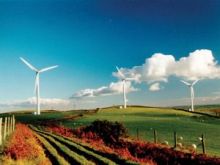According to a statement made by Ivan Nadein on October 11, Ukraine is facing the most expensive heating season in country’s history. That is true because the price for Russian gas is around 250 dollars per thousand cubic meters. It is clear that the government can’t ignore these issues because Ukraine, as it is well-known, uses five times as much mineral fuel as European countries do for the production of one GDP unit. That is why there is a plan to develop the national investment project New Energy, and the government, together with the parliament, for the first time allocated the huge sum of 910 million hryvnias for the target program on improving energy efficiency. However, in fact, this is not all that much. Particularly because, according to the expert, in the present state budget, after its sequestration, there are only 300 million hryvnias left for reconstruction of housing and utilities infrastructure and for improving energy efficiency.
However, the chairman of the National Agency for Effective Use of Energy Resources (NAER) Mykola Pashkevych, who tried himself out in the role of a politician on October 11, is in fight mode. He hopes to create a unified strategy of management and development of energy efficiency and renewable energy sources. Ukraine lacks such a strategy at pre-sent. In order to do this, the official hopes to increase the institutional capacity of NAER as a body that will be in charge of a whole complex of related issues.
If Pashkevych will manage to actually take the power into his hands in this case, then some changes can be expected. The great number of his plans is really impressive. Firstly, he wants to inculcate into the consciousness of Ukrainian people (one and all) the idea of energy efficiency. In order to do that he plans to spread information, propaganda, and agitation.
Secondly, he wants to act rather with a stick than with a carrot, and has called for the abolition of fines and strict norms on energy resource use, replacing them with business partnerships, and effective methods of stimulating with public-private partnership in potential projects. According to him, this practice is successfully used in European countries.
Pashkevych plans to revise and improve a lot of documents and programs that emerged in recent years on the initiative of NAER, and even to create new laws and bylaws, in particular a Law “On Energy Efficiency.” As a result, the head of the National Agency expects to increase the use of renewable energy and to attract a maximum number of investments. He expects that the present and slightly amended law on, so-called, green tariffs will even change the resource base of the Ukrainian energy sector. The only thing that troubles the head of country’s new energy sector are natural obstacles (such as that wind power stations cannot be built on the routs of migratory birds) and the absolute incapability of Ukrainian electrical networks to receive resources produced by the nonconventional energy sector.
Deputy Director of the Environment and Energy Institute Oleh Horbunov said that in the “metallurgist” city of Alchevsk, thanks to the scientists’ research, it will soon be possible to totally stop using gas for heating systems in residential buildings. According to his words, the overall potential of bioenergy can serve 12 million people, i.e., practically all Ukrainians involved in the agricultural sector.
Nadein hopes that the government will encourage development in renewable energy. But at the same time he underscores the insufficiency of stimulation mechanisms for thermal energy, because the stimuli for investors are very small, while risks are high. One of the main risks is the debt of the population for housing and public utilities, which hovers around eight billion hryvnias.
In any case it is nice to hear about the innovative approaches of NERC. But it is somehow strange that at the same time there is a fine line between them and deep-rooted backwardness in other institutions. For example, answering The Day’s question on why green tariff do not apply to gas and electricity produced by processing animal waste, Pashkevych said that there is a decision to limit development to those renewable energy sources which are reflected in the abovementioned law. He said that the budget won’t sustain more. Then he began to talk about the benefits provided for the respective owners of livestock enterprises. He just could not say why there are so few investors who are interested in working with this industry. In the meantime the Ukrainian dairy and beef herd continues to melt. It would be a good idea to solve the problems of energy and livestock industries together, as both of these areas are in unfavorable situation today. Where is state policy?







